Growing healthy and productive tomato plants is the goal of every gardener. However, aphids on tomato plants can quickly turn this dream into a nightmare. These tiny pests can wreak havoc on your tomato plants, leading to reduced yields and damaged plants. But fear not, there are effective solutions to both prevent and combat aphid infestations.
In this blog post, we will guide you through the process of identifying aphids on your tomato plants, understanding their impact, and exploring various methods to control and prevent these destructive pests. By the end of this post, you will be well-equipped to protect your tomato plants and enjoy the fruits of your labor.
Diatomaceous Earth – the only official supplement – we are the only producers of food grade diatomaceous earth products that meet all requirements for health supplements in the USA.
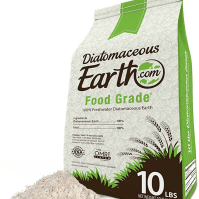
Short Summary
Identify and take preventive action against aphids on tomato plants to protect fruit.
Introduce beneficial insects & use organic methods like companion planting, diatomaceous earth & neem oil treatments for sustainable control.
Monitor infestations and use preventative measures such as bird friendly gardens & yellow sticky traps for long term management.
Identifying Aphids on Tomato Plants
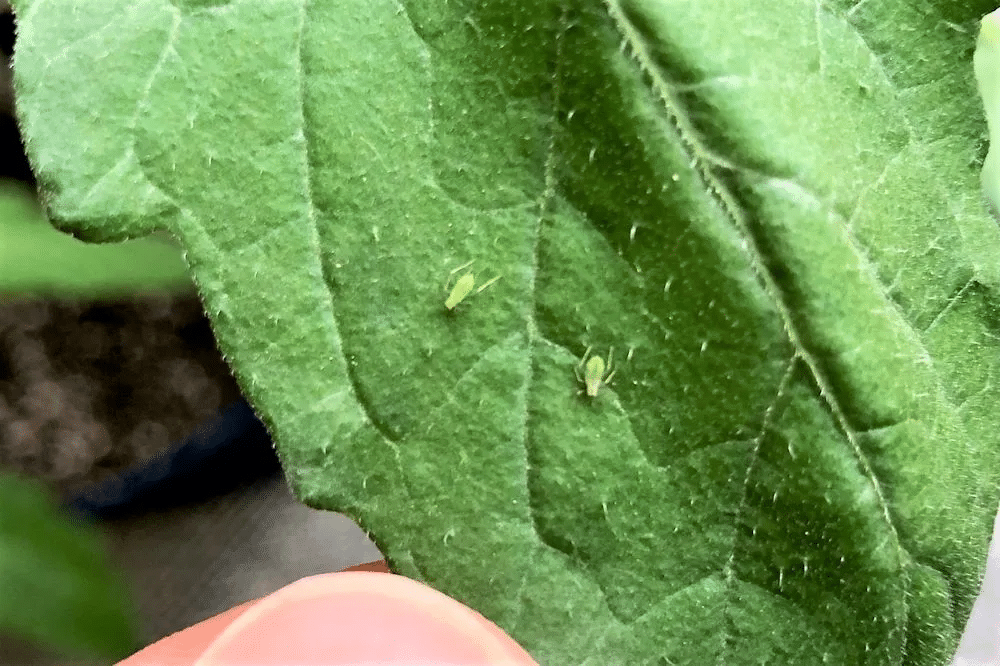
Aphids are small, pear-shaped, soft-bodied insects that can infest tomato plants. They can be found in various colors such as green, gray, black, brown, yellow, or white – often matching the color of the plant they feed on. To locate these tiny bugs, inspect the undersides of leaves and along the stem of tomato plants. Catching aphids early is crucial to protect your tomato fruit and prevent a full-blown aphid infestation.
In addition to tomato plants, aphids are also common pests that feed on other vegetables such as peppers and cucumbers, as well as flowers, shrubs, and trees. This wide range of host plants makes it even more important to be vigilant in detecting their presence in your garden.
Taking preventive action is essential to safeguard your tomato fruit and avert a full-blown aphid infestation. To prevent aphids, you can use companion planting, introduce natural predators, or use organic methods.
The Impact of Aphids on Your Tomato Plants
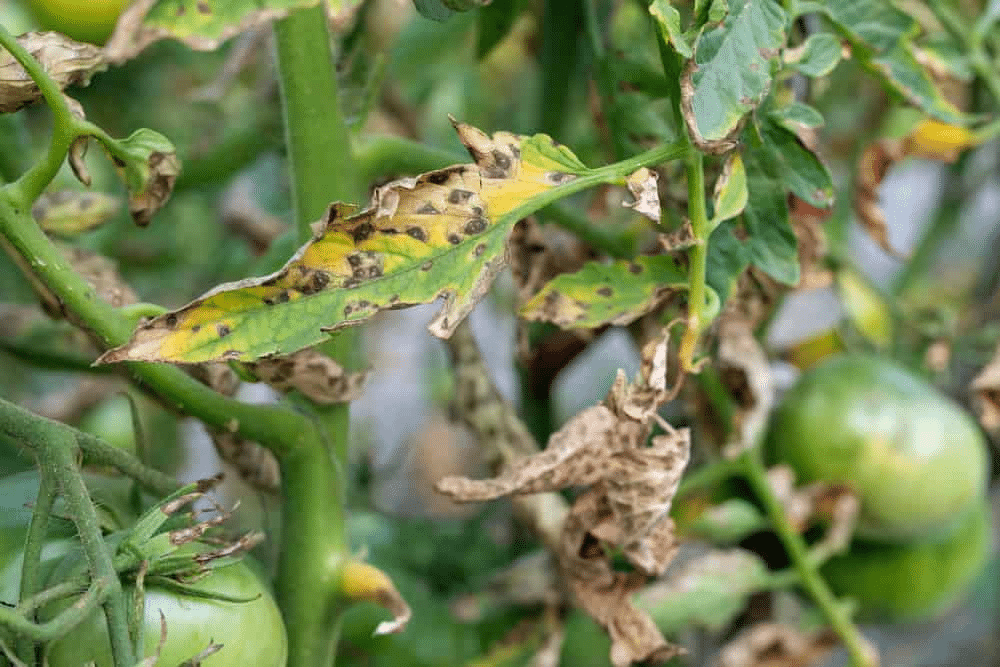
Aphids can cause significant harm to tomato plants by damaging soft tissues, impeding growth, or transferring diseases. They reproduce rapidly, with a female aphid capable of producing up to 80 offspring in a week. Hundreds to thousands of aphids can appear in a short amount of time. This phenomenon can happen within only a few weeks. To maintain healthy tomato plants, it's essential to monitor and control aphid infestations.
A severe aphid infestation can result in curling, yellow leaves and a decreased yield of tomatoes. Aphids are also known to transmit plant viruses such as mosaic and leaf roll viruses. To protect your tomato plants naturally from aphids, you can use companion planting, introduce natural predators, or use organic methods like diatomaceous earth or neem oil treatments.
One of the initial approaches to address the presence of aphids on tomato plants is by spraying aphids off the plant with water. This method is remarkably effective, but it is imperative to ensure all leaves are thoroughly covered. Spraying should be done once or twice a week.
Beneficial Insects for Aphid Control
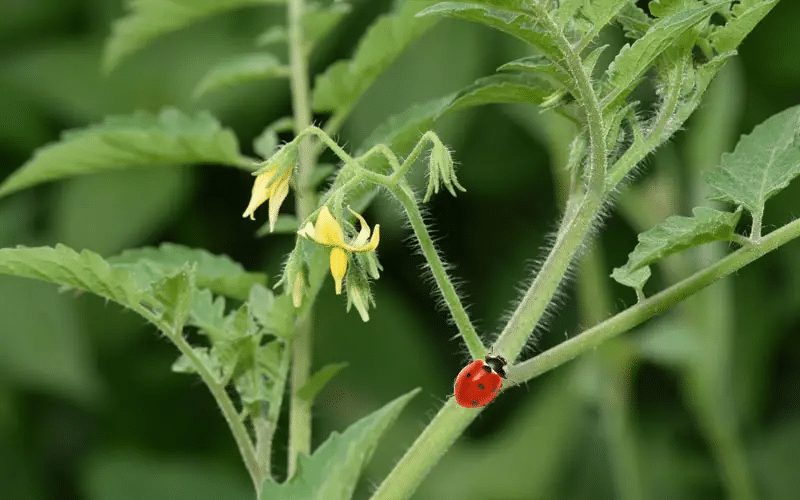
Introducing beneficial insects like ladybugs, lacewings, praying mantis, and hover flies can help control aphids. These predatory insects feed on aphids, helping to keep their populations in check. By attracting these natural predators to your garden, you can reduce the need for chemical pesticides and maintain a healthier ecosystem.
Some examples of aphid predators include ladybugs (also known as lady beetles), lacewings, and parasitic wasps. Ladybugs are known to be effective at controlling aphids. Even more efficient at this task, however, are the larvae of ladybugs. To introduce these beneficial insects into your garden, you can purchase them from gardening supply stores or online retailers, or you can attract them naturally by planting flowers and herbs that they are drawn to.
By fostering a garden environment that supports beneficial insects, you can achieve a more natural and sustainable approach to aphid control. These insects not only help to control aphid populations, but they also contribute to overall garden health by pollinating plants and controlling other pests.
Organic Methods to Combat Aphids
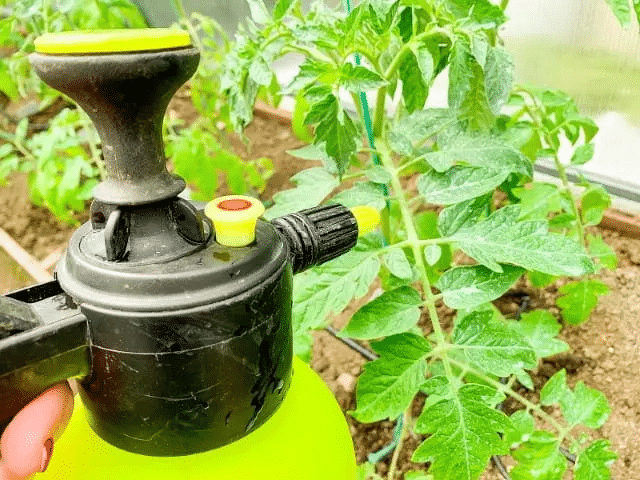
For gardeners who prefer organic solutions, there are several effective methods to combat aphids, including companion planting with herbs and flowers, using diatomaceous earth, and neem oil treatments.
Each of these methods offers a natural and eco-friendly approach to controlling aphid infestations, while preserving the health and vitality of your tomato plants.
Companion Planting
Companion planting is a horticultural technique in which different plants are planted together to improve the overall health of the garden. Certain companion plants can help reduce the likelihood of aphids infesting tomato plants, while also attracting beneficial insects that can control aphid populations more effectively. Examples of companion plants that can protect tomato plants from aphids include marigolds, nasturtium, mint, tansy, and cilantro.
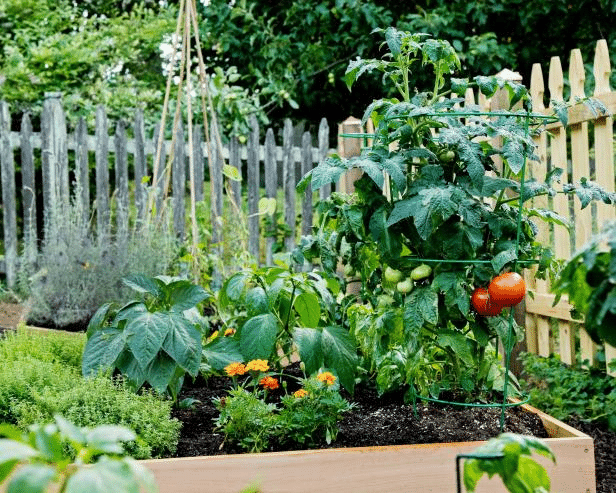
Interplanting your tomato plants with herbs and flowers is an effective way to control aphids. This will also attract the native predatory insects in your area. This method not only helps to deter aphids, but also contributes to a more biodiverse and healthy garden ecosystem.
Establishing a well-developed beneficial insect and pollinator garden is essential for long-term pest control. By incorporating a diverse range of plants that attract and support beneficial insects, you can create a more resilient and balanced garden environment that naturally resists aphid infestations.
Diatomaceous Earth
Diatomaceous earth is a white powder composed of crushed fossils, which is known to be abrasive to the soft skin of aphids. When applied to the affected plants, it slices through their skin, resulting in dehydration and eventual death. This makes diatomaceous earth an effective and natural method for controlling aphid populations.
Find the Best Price on Diatomaceous Earth Here
For optimal results, it is best to apply diatomaceous earth in the early morning when the dew has dried. Alternatively, application can be done later in the evening. However, it is important to note that diatomaceous earth is only effective when dry, so its insecticidal activity is reduced if it becomes wet from watering or precipitation.
Some gardeners have expressed concern that using diatomaceous earth may have an adverse effect on bees and other beneficial insects. To minimize any potential harm, apply the powder carefully and only to the affected plants, avoiding areas where beneficial insects are known to be active.
Neem Oil Treatment
Neem oil is a natural insecticide derived from the neem tree and has been found to be effective in disrupting the reproductive cycle of aphids, thus preventing them from laying eggs. This makes it a valuable tool in the fight against aphid infestations on your tomato plants.
To use neem oil effectively, apply it as a spray to the affected plants in the evening after the sun has set to prevent any leaf burns. Be sure to thoroughly cover all surfaces of the plant, as the oil needs to come into direct contact with the aphids to be effective.
If your spray bottle becomes clogged when using neem oil spray an alternate method is to use a sponge to apply the neem to your plants. This ensures that the treatment reaches all affected areas, even when the spray bottle is not functioning properly.
Preventative Measures for Aphid Infestations
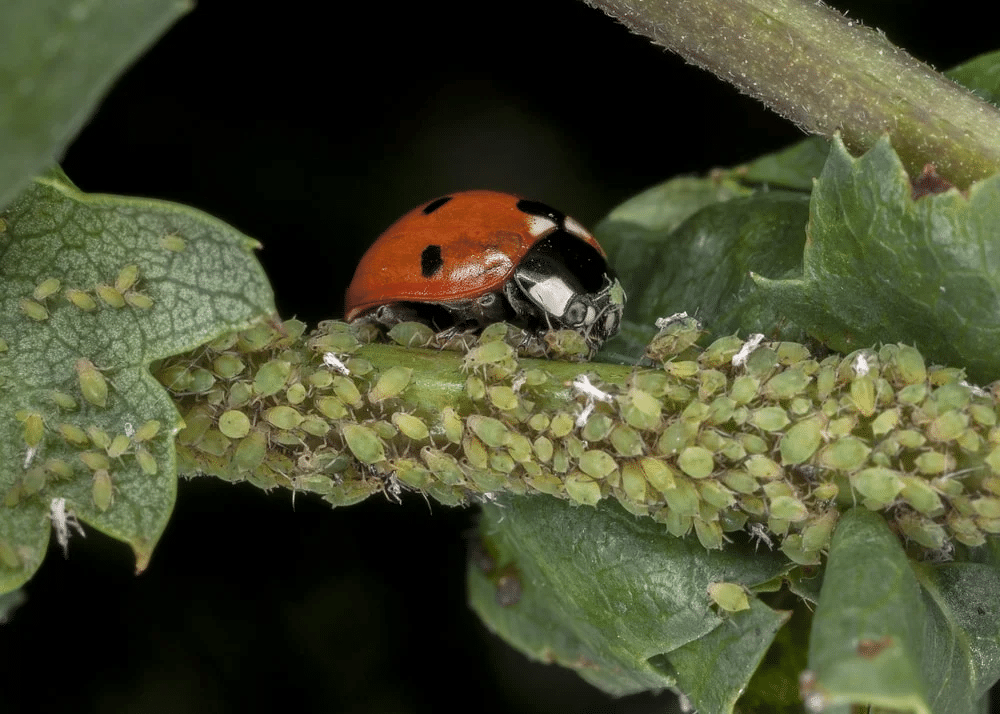
Preventative measures are essential for maintaining healthy tomato plants and avoiding the damage caused by aphid infestations. By creating a bird-friendly garden, using yellow sticky traps, and attracting more aphid predators, you can effectively prevent these pests from gaining a foothold in your garden.
A bird-friendly garden can be created by growing pollinator- and beneficial insect-attracting plants and installing birdhouses and feeders nearby. Birds are natural predators of many garden pests, including aphids, and encouraging their presence in your garden can help keep aphid populations in check.
Yellow sticky traps are another useful tool for preventing aphid infestations. These traps are designed to attract aphids and trap them before they can reach your garden plants. By placing these traps around your tomato plants, you can catch aphids before they have a chance to cause any damage.
Monitoring and Ongoing Aphid Management
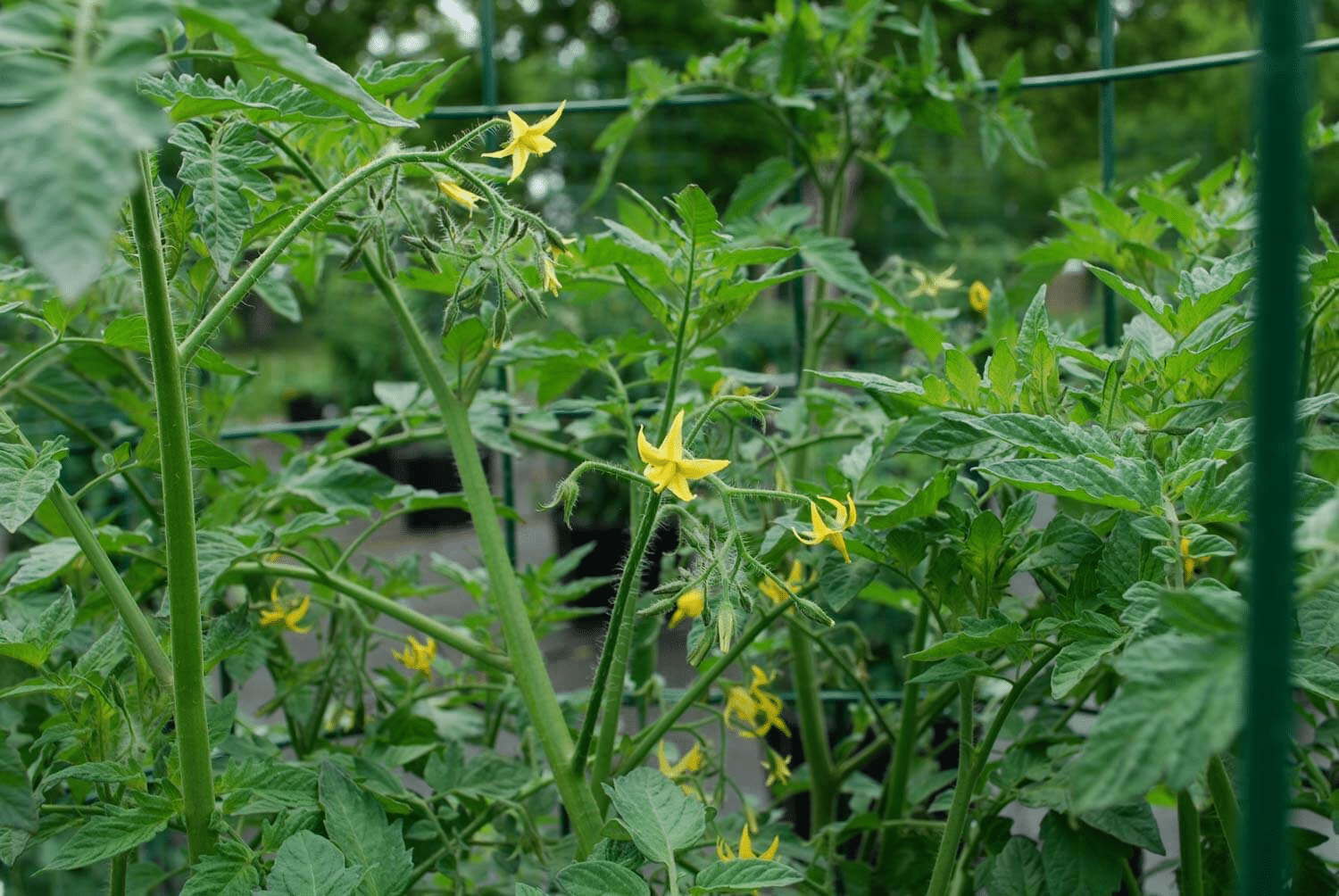
Regular monitoring and ongoing aphid management are crucial to keeping your tomato plants healthy and aphid-free. By inspecting your plants daily for signs of aphid infestations and taking prompt action to control any detected populations, you can prevent these pests from causing significant damage to your plants.
Diatomaceous Earth – the only official supplement – we are the only producers of food grade diatomaceous earth products that meet all requirements for health supplements in the USA.

Manual removal of aphids is an effective method for controlling small populations. Gently pick the aphids off the lower surfaces of leaves and submerge them in a bucket of soapy water to kill them. Be cautious not to harm the vegetation while compressing the aphids, and avoid excessive tapping or shaking of the leaves. Inspect for new aphids daily to ensure effective ongoing management.
For larger aphid populations, a forceful spray of water from a garden hose can effectively remove aphids from tomato leaves and stems. Alternatively, try using homemade bug repellents, such as a mixture of garlic, rosemary or peppermint, water, and dish soap. Reapply the repellent at regular intervals until you observe a reduction in the aphid population on your plants.
Summary
In conclusion, aphid infestations can pose a significant threat to the health and productivity of your tomato plants. By identifying aphids early, understanding their impact, and employing a combination of beneficial insects, organic methods, preventative measures, and ongoing management, you can effectively protect your tomato plants from these destructive pests.
As gardeners, it is our responsibility to maintain healthy, vibrant gardens that not only produce delicious fruits and vegetables, but also support a diverse ecosystem of beneficial insects and wildlife. By diligently monitoring your tomato plants and employing effective, eco-friendly solutions, you can enjoy the fruits of your labor and contribute to a healthier environment for all.
Frequently Asked Questions
Can tomatoes survive with aphids?
While it is possible for tomatoes to survive an aphid infestation, the damage done by the pests can stunt the plant's growth and lower yields. Additionally, excessive sap removal caused by the aphids can lead to leaves curling, decreased leaf area and increased sun scald on the fruit.
Taking measures to control an aphid infestation is important for tomato plants to remain healthy.
Will soapy water kill aphids on tomato plants?
Yes, soapy water can effectively kill aphids on tomato plants. A combination of dish soap and water sprayed onto the leaves, stems, and buds of the plant will coat the aphids and suffocate them.
This method is also safe for humans and animals when used in moderation.
Why do tomatoes get aphids?
Tomatoes get aphids because these tiny bugs are attracted to the sweet sugary sap and lay eggs on the plant, which quickly hatch into more of the pests. Over time, the infestation spreads, leading to plant damage and decreased yields.
Diatomaceous Earth – the only official supplement – we are the only producers of food grade diatomaceous earth products that meet all requirements for health supplements in the USA.


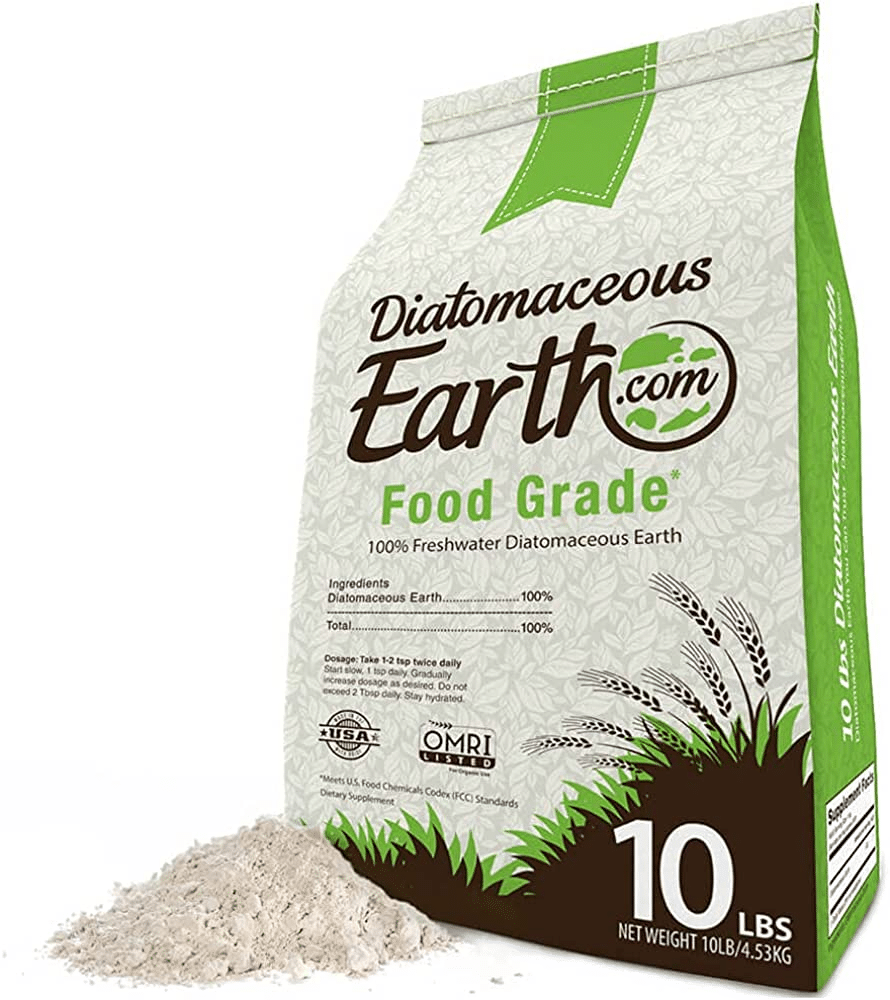

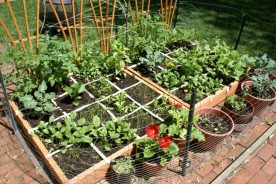
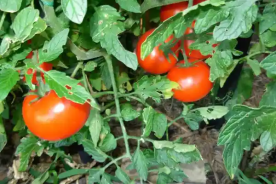

No Comments